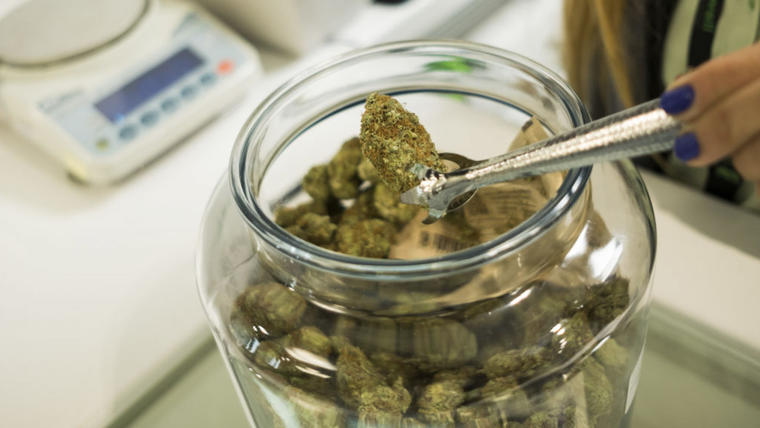By Alicia Victoria Lozano - NBC News
As the cannabis industry continues to gain ground state by state, Congress will consider removing marijuana from the federal Controlled Substances Act once and for all.
The House of Representatives approved this Friday the Marijuana Reinvestment and Elimination of Criminal Records Act, or the MORE Act, for its acronym in English, which will allow the
decriminalization of cannabis
and clear the way to
erase non-violent federal convictions for possession of marijuana.
This law, if also passed by the Senate, would create ownership opportunities in this emerging industry, obtain
medical
cannabis
recommendations
from doctors from the Department of Veterans Affairs, and establish funding sources to reinvest in communities disproportionately affected by the war on drugs, black and Latino communities.
The Senate of Mexico approves a proposal to legalize the recreational use of marijuana
Nov. 21, 202000: 48
This Friday's vote represents a milestone: it
is the first time that a full chamber of Congress has addressed the federal decriminalization of cannabis
.
"It's the right thing to do," said Oregon Democratic Rep. Earl Blumenauer, a co-sponsor of the bill and co-chair of the Congressional Cannabis Caucus.
"For a long time,
the war on drugs has been directed at young people,
especially young black men, and has rejected the advice of experts," added Blumenauer, whose congressional district includes parts of Portland.
The Democrat has worked to end cannabis prohibition since the 1970s, when he was in the state legislature.
New Jersey Passes Legalization of Recreational Marijuana
Nov. 4, 202000: 24
For him,
the war on drugs "never made sense"
and said it was born out of Republican President Richard Nixon's "cynical" opinion on cannabis and other controlled substances.
Nixon declared a "war on drugs"
in the early 1970s, calling drug abuse
"public enemy number one,"
following the rise in recreational drug use in the 1960s.
Through strict enforcement of the law and prison sentences, he set out to reduce use, distribution and trade.
Unlike heroin and cocaine, which are also drugs that appear on the Government's Drug Classification 1 (out of a list of five),
cannabis is not addictive
, and has been shown to have
therapeutic properties
to treat pain, according to Blumenaer.
[Los Angeles eliminates marijuana convictions and thousands of Latino migrants breathe easier]
Although the Centers for Disease Control and Prevention (CDC, in English) and other organizations indicate that
marijuana can be addictive.
"Public acceptance is at an all-time high," he said.
Marijuana won big on Election Day in November.
Five states — Arizona, New Jersey, South Dakota, Montana, and Mississippi — have passed measures to legalize some form of its use.
Now 15 states, two territories, and Washington DC, have legalized cannabis for recreational use, while
34 states and two territories allow medical marijuana.
"For decades, discriminatory policies on cannabis have perpetuated another form of
systemic racism
in the United States, and this law will initiate a restorative justice process for the worst off," said California Democratic Rep. Barbara Lee, who co-sponsored the bill. with Blumenauer.
In a joint letter to Congress, Lee and Blumenauer said their reform efforts underscore the "critical issue of
racial justice and the failed war on drugs that has devastated racial minorities
, especially black and brown communities." .
"We cannot continue to ignore our duty to repair the damage that this damaging form of systemic racism has done," the letter warns.
The trend to normalize cannabis is not specific to the United States;
it is part of a worldwide movement to end its ban.
The UN Commission on Narcotic Drugs this week voted to remove marijuana and its resin from the category of the world's most dangerous drugs, clearing the way for further research.
Despite the recent success of the reforms, many legislators continue to oppose the federal decriminalization of cannabis.
Among them is Arizona Republican Representative Debbie Lesko, who intends to vote against the MORE Act.
In his opinion, the Democrats have "chosen to waste the time of the House of Representatives" with a bill that "will never become law," he said in an email.
"It is not only a dereliction of duty, the project is simply
bad policy,
" he said.
[The Senate of Mexico approves an initiative to legalize the recreational use of marijuana]
"It does nothing to discourage use by children, does not require a warning label about the health risks it poses, and ignores the science that marijuana directly affects the parts of the brain responsible for memory and learning, "he said.
Supporters of the bill believe that the MORE Act will
reconcile legal tensions between the states and the federal government.
With this law,
large banks and institutions
are more likely to
enter the marijuana industry
once a legal framework is established, warned Justin Strekal, political director of the National Organization for the Reform of Marijuana Laws (NORML, in English).
"It's a bad strategy when you have states that completely defy the federal government," he said.
"It breeds a lack of respect for the law," he added.
[Why the tunnels under the US-Mexico border can be worth millions of dollars to traffickers]
While advocates hope that the MORE Act will pass in the Democratic-controlled lower house, the Senate presents another hurdle.
Majority leader there, Republican Mitch McConnell, has criticized Democrats' efforts to include diversity studies as part of cannabis reform, arguing that this year lawmakers should focus on the US pandemic aid package. coronavirus.
Still, McConnell, who supports the industry, met with insiders last year in California, pointing out to some experts that perhaps cannabis reform is much closer to becoming a reality.
[Activists demand legalization of marijuana in Mexico]
"More and more this is becoming a bipartisan issue," said J. 'Smoke' Wallin, CEO of Vertical Wellness, a California-based cannabis company.
"When you look at the states that just passed cannabis laws, you have blue, red and purple. It's more a question of when is it going to happen and how," he alleged.

